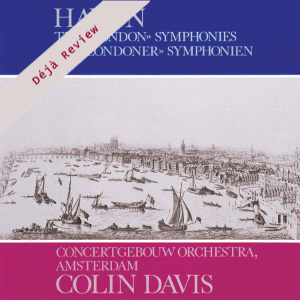
Déjà Review: this review was first published in September 2001 and the recording is still available.
Franz Joseph Haydn (1732-1809)
6 London Symphonies
Symphony No. 94 in G “Surprise”
Symphony No. 96 in D “Miracle”
Symphony No. 100 in G “Military”
Symphony No. 101 in D “Clock”
Symphony No. 103 in E flat “Drum Roll”
Symphony No. 104 in D “London”
Concertgebouw Orchestra Amsterdam/Sir Colin Davis
rec. 1976-81, Concertgebouw, Amsterdam
Philips 4647072 [2 CDs: 156]
The 1970s were important years for our appreciation of Haydn, bringing integral sets of the symphonies, the string quartets and the piano sonatas, followed by the exploration of many of the operas. The idea that Haydn was a mere periwigged contemporary of Mozart, very pretty and much given to “jokes”, was banished for ever.
In one sense Sir Colin Davis played no part in this reassessment since he has remained faithful to the “core” Haydn repertoire. But he very much expanded our knowledge of the composer through the sheer excellence of his interpretations, interpretations which could perhaps only have come in a moment when people were prepared to listen to Haydn seriously. Thanks to a certain tense, nervous energy which informs all his conducting, these are not “relaxed” or “genial” or “delightful” interpretations, but while such an approach in Szell or Solti could lead to aggressiveness, Davis keeps things wonderfully buoyant so that even the fastest tempi never seem hard-driven (the warm Concertgebouw acoustic helps, of course). And although these are very much “conducted” performances, with a wide range of dynamic shading, there is also a sense that the musicians are really listening to one another, obtaining a chamber-music-like delicacy in the softer sections.
Amid such excellence I hardly feel I want to single out any particular movements (there were absolutely none where I was not wholly convinced by the interpretation) but I want to suggest that Davis’s greatest revelation lies in pointing out that drama is latent even in Haydn’s most innocent statements. The percussion in the slow movement of the Military prove to be not a zany joke but an impassioned outburst; the strange wrong turnings in the Oxford’s slow movement come as a reasoned argument after all and even the folk-like innocence of the Miracle’s finale can break into minor-key drama at a moment’s notice. Although the real Miracle symphony was no. 102 not no. 96, the sudden reduction of the orchestra to a chamber group in the later stages of the slow movement is so beautiful here that any audience could be justified in going to hear the players close up.
The minuets, of course, are not subject to drama as the other movements are, and Davis interprets them unhurriedly but with a care for rhythms and phrases which never lets them sag. Sample that of the Clock for a placing of the accents that brings to life music that is all too often just played blandly through.
There have been a number of distinguished sets of the London symphonies (somebody should reissue the recordings by Mögens Wöldike which were in some ways a precursor of the Davis approach) but this is second to none. The only problem is that we have just the six named symphonies, and what right-minded person would want to be without the six unnamed ones?
The recordings still sound excellent and the notes are in the expert hands of Robin Golding.
Christopher Howell
Help us financially by purchasing from




















